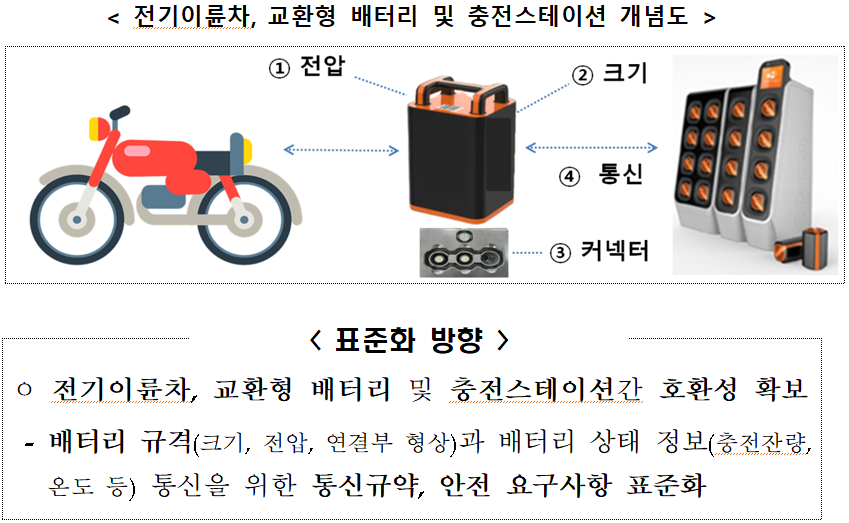전기이륜차 배터리의 충전시간(3~4시간), 가격(100~150만원), 제조사별 상이한 규격 등의 문제점으로 인해 교환형 배터리 스테이션 표준화 필요성이 제기됨에 따라 산업부는 전기 이륜차 교환형 배터리 충전스테이션(3종) 및 전기이륜차(1종)에 대하여 국가표준을 제정했다.

▲전기이륜차, 교환형 배터리 및 충전스테이션 개념도 (그림 출처: 산업부)
전기이륜차 배터리 충전스테이션 포함한 모듈 간 상호호환성 확보
유류비 절감·충전시간 단축·매연·소음 저감 등 친환경 효과 기대
전기이륜차 배터리의 충전시간(3~4시간), 가격(100~150만원), 제조사별 상이한 규격 등의 문제점으로 인해 교환형 배터리 스테이션 표준화 필요성이 제기됨에 따라 산업부는 전기 이륜차 교환형 배터리 충전스테이션(3종) 및 전기이륜차(1종)에 대하여 국가표준을 제정했다.
산업통상자원부 국가기술표준원(원장 진종욱)은 8일(금) 한국산업표준 KS R 6200-1 전기이륜차 교환형 충전스테이션 등 4종을 국가표준으로 신규 제정 고시한다.
지난해 전기 이륜차용 교환형 배터리 팩에 대한 국가표준 4종을 제정하였고, 올해는 전기 이륜차 교환형 배터리 충전스테이션(3종) 및 전기이륜차(1종)에 대하여 국가표준을 추가 제정함으로써, 전기이륜차 배터리 충전스테이션을 포함한 모듈 간 상호호환성 확보를 위한 기반을 마련했다.
전기 이륜차 교환형 배터리 충전스테이션(3종) 중 일반사항은 정격공급전압, 전격출력전압, 사용환경, 감전보호, 고정 방식, 형상 및 구성요소, 작동 시나리오 등에 대한 내용이 담겼다.
두 번째로 안전과 성능 요구사항은 일반사항(정격공급전압, 전격출력전압), 안전 요구사항(기계적 및 전기적) 및 시험방법, 보호등급, 설치 설명서와 같은 안전과 성능 시험방법 명시해야 한다는 내용이다.
마지막으로 공용 충전스테이션 일반 요구사항은 일반사항(정격공급전압, 전격출력전압), 전압에 따른 분류(48V, 72V), 전기적 특성 및 통신 프로토콜 요구사항에 대한 상호호환성 명시하라는 내용이다.
전기이륜차(1종)에 대해서는 공용 교환형 배터리 팩을 적용한 전기이륜차의 요구사항으로 일반사항(구조, 분류), 기계적, 전기적 특성과 통신 프로토콜, 공용 교환형배터리 팩에 대한 전기이륜차 안전 요구사항을 명시하라는 내용이 담겼다.
그간 국표원은 국가표준 제정을 위해 3번에 걸친 기업간담회와 설명회를 통해 전기이륜차 및 충전스테이션 안전 요구사항에 대한 중소제조사의 기술 경쟁력 향상과 상호호환성 확보를 위해 기업 의견을 수렴하는 자리를 가졌다.
국내 배달라이더 업계는 유류비 절감, 충전시간 단축, 매연, 소음 저감 등 친환경 효과를 기대하고 있다.
향후, 국표원은 전기이륜차 국제표준 선점을 위해 우리기술로 제정된 국가표준을 국제표준으로 제안할 계획이다.
진종욱 국가기술표준원장은 “전기 이륜차 시장은 국내의 시장 경쟁력 확보와 수출시장 다변화를 위해 국가표준을 수립하고 국제표준을 선도하는 것이 필요하다”며 “우리나라가 전기이륜차 및 충전스테이션 분야의 선도국으로 자리매김할 수 있도록 적극적으로 국제표준 활동을 지원하겠다”고 밝혔다.
